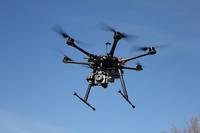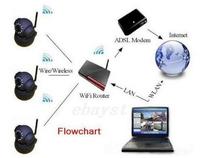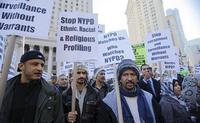-
NSA, other agencies, collect millions of images for large facial recognition databases
The NSA, through its global surveillance operations, has been accumulating millions of images from communication interceptions for use in high-level facial recognition programs, according to classified 2011 documents leaked by Edward Snowden. The documents do not reveal how many people have been targeted with facial recognition programs, but given the NSA’s foreign intelligence mission, a bulk of the imagery collected would involve foreign nationals.
-
-
Drone surveillance raises legal, ethical concerns

The use of drones for domestic security purposes, surveillance of citizens, and putative criminals and organizations raises many legal and ethical concerns particularly with regard to the Fourth Amendment to the U.S. Constitution, Council of Europe instruments, and the EU Data Protection Framework. Experts suggest that the rise of drones for surveillance and other applications highlights particular challenges to civil liberties and tensions between these and national security and justice concerns.
-
-
Snowden revelations spur a surge in encrypted e-mail services
The Edward Snowden revelations about National Security Agency(N.S.A) surveillance programs have fueled a surge of new e-mail encryption services. “A lot of people were upset with those revelations, and that coalesced into this effort,” said the co-developer of a new encrypted e-mail service which launched last Friday. The company notes that its servers are based in Switzerland, making it more difficult for U.S. law enforcement to reach them.
-
-
Wireless camera network offers new possibilities for security systems

Advances in computer technology are opening up new possibilities for surveillance cameras and environmental video monitoring systems. A graduate engineering student used off-the-shelf components to build a prototype device for a solar-powered wireless network of smart cameras with potential applications in security systems and wildlife monitoring.
-
-
Wisconsin silent about cell phone tracking by state police
The Wisconsin Department of Justice(DOJ) is refusing to acknowledge that it has deployed Stingray technology to track Wisconsin residents’ cellphones, despite reports claiming the state has used the technology during previous investigations. The state also denied a public records request made in April seeking details on how often Stingray technology is used, how data is stored and shared, and how often warrants are obtained.
-
-
Virginia lawmakers mull limiting police use of license plate readers
Some Virginia lawmakers are planning to propose legislation which will limit the police use of license plate readers (LPRs). The state currently has no laws restricting how police collect or store license plate data gathered by LPRs. Last year, then-Attorney General Ken Cuccinelli said he believed Virginia State Police should be restricted from capturing and storing license plate data outside of a specific, ongoing criminal investigation, but for now, police departments across the state have adopted their own measures.
-
-
U.S. approves fewer security clearances
A new report by the Office of the Director of National Intelligence(ODNI) shows that the number of new security clearances provided by the federal government, both initial clearances and renewals, has decreased by 9 percent since 2011. The number of approved clearances decreased for the second consecutive year in fiscal 2013, to just over 777,000.One observer saidthe reduction is a response to a period in the mid-2000s when “basically everyone needed a clearance.”
-
-
Access of Russian surveillance craft to U.S. airspace questioned
Under the Treaty on Open Skies (OS), signed in 1992 and ratified in 2002, thirty-four nations allow the protected passage over their territory of surveillance aircraft from other OS signatory member states, aircraft featuring advanced sensory equipment that allow for the monitoring of arms controls compliance and troop movements. With rising U.S.-Russia tensions over Ukraine, and with information emerging about a new Russian surveillance aircraft model equipped with the most advanced surveillance capabilities, U.S. government officials and lawmakers question whether OS-related Russian surveillance flights over the United States should continue.
-
-
Adoption of battlefield surveillance system in urban settings raises privacy concerns
More cities are adopting an aerial surveillance system first developed for the military. The surveillance cameras, fitted on a small plane, can record a 25-square-mile area for up to six hours, and cost less than the price of a police helicopter. The system also has the capability of watching 10,000 times the area that a police helicopter could watch. Privacy advocates are concerned. “There are an infinite number of surveillance technologies that would help solve crimes, but there are reasons that we don’t do those things, or shouldn’t be doing those things,” said one of them.
-
-
NYPD shuts down controversial Muslim surveillance program

The New York Police Department has shut down its “Demographics Unit,” known for secretly infiltrating Muslim communities in New York and New Jersey with informers. The Muslim surveillance program, initiated under former NYPD commissioner, Raymond Kelly, is the subject of two federal lawsuits and has faced growing criticism from civil rights groups. NYPD acknowledged that in its 10-year existence, the surveillance program has not generated even a single lead.
-
-
Rep. Rogers: Edward Snowden helped by Russia, backs Russian expansionism
Representative Mike Rogers (R-Michigan), chairman of the House of Representatives intelligence committee, on Sunday repeated his claim that Edward Snowden had been helped by Russia. “No counter-terrorism official in the United States does not believe that Mr. Snowden … is not under the influence of Russian intelligence services. We believe he is, I certainly believe he is today,” Rogers said.
-
-
NSA program captures, replays phone calls
The NSA’s MYSTIC program, created in 2009, deploys a “retrospective retrieval” (RETRO) tool which allows agents to rewind and playback all phone conversations that have taken place in the past thirty days in an unnamed foreign country, according to Edward Snowden-leaked documents. The MYSTIC program differs from other NSA surveillance programs revealed by Snowden because it captures the content of phone conversations, not just calls’ metadata.
-
-
Facebook making snooping more difficult
Facebook has joined its Silicon Valley competitors to improve cybersecurity following a recent report suggesting that the NSA may have posed as Facebook to infect targeted computers. Joe Sullivan, Facebook’s chief security officer, said Facebook was working to “make sure the system is robust enough that everyone should be coming in the front door with legal process and not getting information any other way.” He added that no one could pose as Facebook servers any more since the company made “https,” a secure method of accessing Web pages, standard last year.
-
-
MetaPhone: The sensitivity of telephone metadata
Is telephone metadata sensitive? This is, at base, a factual dispute. Is it easy to draw sensitive inferences from phone metadata? How often do people conduct sensitive matters by phone, in a manner reflected by metadata? New research finds that phone metadata is unambiguously sensitive, even in a small population and over a short time window. The researchers were able to infer medical conditions, firearm ownership, and more, using solely phone metadata.
-
-
Collecting digital user data without compromising privacy
The statistical evaluation of digital user data is of vital importance for analyzing trends. It can also undermine users’ privacy. Computer scientists have now developed a novel cryptographic method that makes it possible to collect data and protect the privacy of the user at the same time.
-
- All
- Regional
- Water
- Biometrics
- Borders/Immig
- Business
- Cybersecurity
- Detection
- Disasters
- Government
- Infrastructure
- International
- Public health
- Public Safety
- Communication interoperabillity
- Emergency services
- Emergency medical services
- Fire
- First response
- IEDs
- Law Enforcement
- Law Enforcement Technology
- Military technology
- Nonlethal weapons
- Nuclear weapons
- Personal protection equipment
- Police
- Notification /alert systems
- Situational awareness
- Weapons systems
- Sci-Tech
- Sector Reports
- Surveillance
- Transportation
Advertising & Marketing: advertise@newswirepubs.com
Editorial: editor@newswirepubs.com
General: info@newswirepubs.com
2010-2011 © News Wire Publications, LLC News Wire Publications, LLC
220 Old Country Road | Suite 200 | Mineola | New York | 11501
Permissions and Policies
Editorial: editor@newswirepubs.com
General: info@newswirepubs.com
2010-2011 © News Wire Publications, LLC News Wire Publications, LLC
220 Old Country Road | Suite 200 | Mineola | New York | 11501
Permissions and Policies
